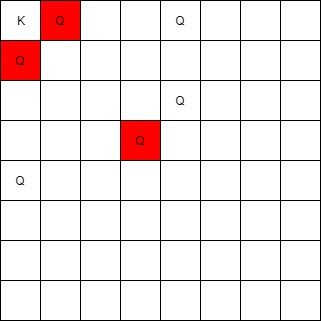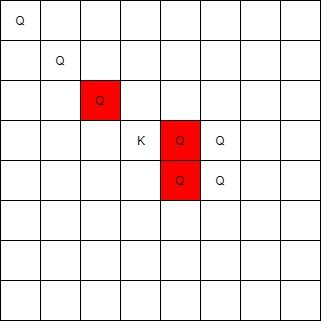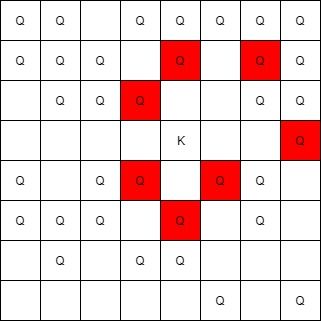On an 8x8 chessboard, there can be multiple Black Queens and one White King.
Given an array of integer coordinates queens that represents the positions of the Black Queens, and a pair of coordinates king that represent the position of the White King, return the coordinates of all the queens (in any order) that can attack the King.
Example 1:
Input: queens = [[0,1],[1,0],[4,0],[0,4],[3,3],[2,4]], king = [0,0] Output: [[0,1],[1,0],[3,3]] Explanation: The queen at [0,1] can attack the king cause they're in the same row. The queen at [1,0] can attack the king cause they're in the same column. The queen at [3,3] can attack the king cause they're in the same diagnal. The queen at [0,4] can't attack the king cause it's blocked by the queen at [0,1]. The queen at [4,0] can't attack the king cause it's blocked by the queen at [1,0]. The queen at [2,4] can't attack the king cause it's not in the same row/column/diagnal as the king.
Example 2:
Input: queens = [[0,0],[1,1],[2,2],[3,4],[3,5],[4,4],[4,5]], king = [3,3] Output: [[2,2],[3,4],[4,4]]
Example 3:
Input: queens = [[5,6],[7,7],[2,1],[0,7],[1,6],[5,1],[3,7],[0,3],[4,0],[1,2],[6,3],[5,0],[0,4],[2,2],[1,1],[6,4],[5,4],[0,0],[2,6],[4,5],[5,2],[1,4],[7,5],[2,3],[0,5],[4,2],[1,0],[2,7],[0,1],[4,6],[6,1],[0,6],[4,3],[1,7]], king = [3,4] Output: [[2,3],[1,4],[1,6],[3,7],[4,3],[5,4],[4,5]]
Constraints:
1 <= queens.length <= 63queens[i].length == 20 <= queens[i][j] < 8king.length == 20 <= king[0], king[1] < 8- At most one piece is allowed in a cell.
class Solution:
def queensAttacktheKing(self, queens: List[List[int]], king: List[int]) -> List[List[int]]:
n = 8
s = set((i, j) for i, j in queens)
ans = []
for a, b in [[-1, 0], [1, 0], [0, -1], [0, 1], [1, 1], [1, -1], [-1, 1], [-1, -1]]:
x, y = king
while 0 <= x + a < n and 0 <= y + b < n:
x, y = x + a, y + b
if (x, y) in s:
ans.append([x, y])
break
return ansclass Solution {
private static final int N = 8;
private int[][] dirs = new int[][]{{0, -1}, {0, 1}, {1, 0}, {-1, 0}, {1, 1}, {1, -1}, {-1, 1}, {-1, -1}};
public List<List<Integer>> queensAttacktheKing(int[][] queens, int[] king) {
Set<Integer> s = get(queens);
List<List<Integer>> ans = new ArrayList<>();
for (int[] dir : dirs) {
int x = king[0], y = king[1];
int a = dir[0], b = dir[1];
while (x + a >= 0 && x + a < N && y + b >= 0 && y + b < N) {
x += a;
y += b;
if (s.contains(x * N + y)) {
ans.add(Arrays.asList(x, y));
break;
}
}
}
return ans;
}
private Set<Integer> get(int[][] queens) {
Set<Integer> ans = new HashSet<>();
for (int[] queen : queens) {
ans.add(queen[0] * N + queen[1]);
}
return ans;
}
}class Solution {
public:
vector<vector<int>> queensAttacktheKing(vector<vector<int>>& queens, vector<int>& king) {
unordered_set<int> s;
int n = 8;
for (auto& queen : queens) s.insert(queen[0] * n + queen[1]);
vector<vector<int>> dirs = {{0, 1}, {0, - 1}, {1, 0}, {-1, 0}, {1, 1}, {1, -1}, {-1, 1}, {-1, -1}};
vector<vector<int>> ans;
for (auto& dir : dirs)
{
int x = king[0], y = king[1];
int a = dir[0], b = dir[1];
while (x + a >= 0 && x + a < n && y + b >= 0 && y + b < n)
{
x += a;
y += b;
if (s.count(x * n + y))
{
ans.push_back({x, y});
break;
}
}
}
return ans;
}
};func queensAttacktheKing(queens [][]int, king []int) [][]int {
s := make(map[int]bool)
n := 8
for _, queen := range queens {
s[queen[0]*n+queen[1]] = true
}
dirs := [8][2]int{{0, -1}, {0, 1}, {1, 0}, {-1, 0}, {1, 1}, {1, -1}, {-1, 1}, {-1, -1}}
var ans [][]int
for _, dir := range dirs {
x, y := king[0], king[1]
a, b := dir[0], dir[1]
for x+a >= 0 && x+a < n && y+b >= 0 && y+b < n {
x, y = x+a, y+b
if s[x*n+y] {
ans = append(ans, []int{x, y})
break
}
}
}
return ans
}


